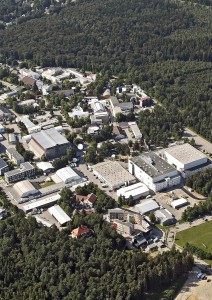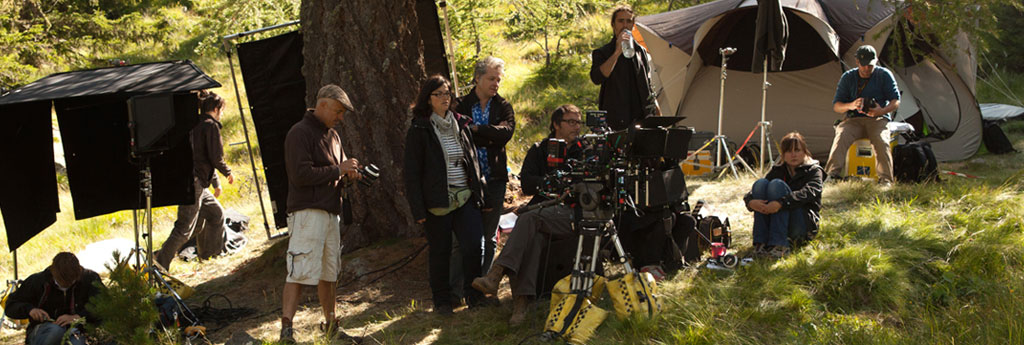
“Going green is no longer a matter of choice”, stated Nevina Satta, CEO Sardegna Film Foundation at the panel discussion Sustainability in Vision that took place at the Majestic Hotel during the Cannes film festival. Hosted by Green Film Shooting and Cine-Regio Green in collaboration with the Italian Film Commissions and Cinecittà Luce, at this event various European experts from Germany, Great Britain, France, Italy and Spain exchanged their experience with sustainable Film/TV production and green cinema. "In our green network Cine-Regio Green the representatives from the various regions are presenting theior new projects and developments", explains Charlotte Applegren, General Scretaty Cine-Regio. "We are delighted that the number of members keeps growing in our green subgroup."
Luca Ferrario, Project Manager, Trentino Film Fund, presented the brand new initiative T- Green Film that will be launched in September. The Trentino Film Fund is launching a new tool to promote environmental sustainability in the film industry. Production companies shooting films or TV series in Trentino can adopt the T- Green Film rating system that will guide them in all the stages of their work towards more sustainability. The film fund will give the productions financial incentives for their green actions. “The companies can choose during the application phase how many green points they intend to obtain”, explained Luca Ferrario.
 The green measures include energy and transport, selection of materials as well as catering. The actions will be monitored by the environmental protection agency, APPA (Agenzia Provinciale per la Protezione dell’Ambiente) in the different stages of production. If the scheme’s criterias are fulfilled, the Trentino Film Fund will reward the company with an incentive.
The green measures include energy and transport, selection of materials as well as catering. The actions will be monitored by the environmental protection agency, APPA (Agenzia Provinciale per la Protezione dell’Ambiente) in the different stages of production. If the scheme’s criterias are fulfilled, the Trentino Film Fund will reward the company with an incentive.
“What Trentino is doing is very unique in Italy”, commented Nevina Satta. “They are pushing existing institutions to work together with their film fund to put together the certification. That is a great best practice. It is the first time that something like this has been done for the audiovisual industry. It is a big step forward for the overall perception of the public administration in the territories.” In Italy, sustainability also has tradition since tourism is an important industry for the whole country. Keeping our environment very controlled is a key element.”
 The Sardegna Film Foundation launched the Heroes 2020 Project, which supports films that treat sustainability issues and that follow green production guidelines. This fund already backed about forty short films and web series. pilots as well as more than twenty short films. Furthermore, there is a film training program for kids. “We teach them to be green filmmakers”, said Nevina Satta.
The Sardegna Film Foundation launched the Heroes 2020 Project, which supports films that treat sustainability issues and that follow green production guidelines. This fund already backed about forty short films and web series. pilots as well as more than twenty short films. Furthermore, there is a film training program for kids. “We teach them to be green filmmakers”, said Nevina Satta.
Tools and training for green filmmaking is also provided by the French consortium Ecoprod that developed a new version of the carbon calculator Carbon Clap.”We are helping film crews to implement the green practices”, emphasized Joanna Gallardo, Adviser, Ecoprod. Furthermore, the organization launched the Ecoprod Charter. We brought all kind of audiovisual companies together. We also want to involve the studios, post production companies and suppliers to take green actions.” In France, these kind of measures are supported by a CNC program, which has a yearly budget of € 6m to support TV and feature film service providers.
Meanwhile the Filmförderung Hamburg Schleswig-Holstein (FFHSH) is greening the Film/ TV industry across in Germany. “We already gave out about 70 Green Shooting Cards”, reported Christiane Dopp from Film Commission Hamburg. The organization also started a collaboration with the local film school in order to implement green training for upcoming filmmakers. This approach will also be followed by the VAF in Belgium.
I’s all about training in Great Britain. BAFTA’s Carbon Literacy training has been adapted by Ffilm Cymru Wales, as CEO Pauline Burt reported. “We gotta beat carbon. But measuring is not enough”, declared Richard Smith, Sustainability Manager, BBC. “We need an action plan.” Therefore, BAFTA developed the certification scheme albert+ which rewards productions with stars for their green actions. The albert+ mark is seen on the end credits of numerous programs across the BBC, ITV, Sky and Channel Four. “This week, the most popular program on the BBC, a soap opera called EastEnders started playing that badge for the first time. We see literally millions of pairs of eyes on this logo every week”, said Richard Smith. For BBC’s Sustainability Manager and his colleagues it is a challenge to work with the audiences so that they do understand more about that green journey. “As a public service broadcaster, it our moral duty to try to fend off the horrors of climate change.”
 This philosophy is also put into action at Bavaria Film in Munich. The thirty hectare square feet studio lot houses twelve sound stages. “Since three years, our studio lot is carbon neutral”, Ina Hoessler pointed out. “We managed to do that in two steps. We changed our heating system to geothermal energy heating. The second step was to switch to renewable energy, especially water power. With the dramatic reduction of its CO2 footprint, Bavaria Film is setting new environmental standards for international studios. “We have been able to reduce our carbon footprint by almost 97.5% during the 2011–2014 period.”
This philosophy is also put into action at Bavaria Film in Munich. The thirty hectare square feet studio lot houses twelve sound stages. “Since three years, our studio lot is carbon neutral”, Ina Hoessler pointed out. “We managed to do that in two steps. We changed our heating system to geothermal energy heating. The second step was to switch to renewable energy, especially water power. With the dramatic reduction of its CO2 footprint, Bavaria Film is setting new environmental standards for international studios. “We have been able to reduce our carbon footprint by almost 97.5% during the 2011–2014 period.”
The Swedish line producer Ronny Fritsche tries to act as sustainable as possible on set but it is still difficult to find enough electric cars for a production. “The most important thing is that we start asking the rental companies for them right now.” The suppliers need a bigger demand for sustainable solutions such as hybrid cars or LED lights.
 In France, the bar for sustainable production was raised by the 3-D animation/live-action adventure picture Minuscule: The Valley of the Lost Ants. Produced by the Paris-based company Futurikon, the animated insects were entirely designed and animated in the studio, while the filmmaking duo Thomas Szabo and Hélène Giraud filmed the background shots in the Mercantour National Park in the Southern French region of Provence-Alps-Cote d’Azur (PACA).
In France, the bar for sustainable production was raised by the 3-D animation/live-action adventure picture Minuscule: The Valley of the Lost Ants. Produced by the Paris-based company Futurikon, the animated insects were entirely designed and animated in the studio, while the filmmaking duo Thomas Szabo and Hélène Giraud filmed the background shots in the Mercantour National Park in the Southern French region of Provence-Alps-Cote d’Azur (PACA).
The entire film crew was accommodated in nearby lodgings, so everyone could walk or bike to the set. “All of our crew members understood that this is important because we wanted to act responsible in this environment”, stressed French Producer Mylène Ollivier. The flowing streams and natural greenery were filmed with available light whenever possible. The gaffers simply used reflectors instead of light. A solar-powered camper, serving as production hub, supplied a low-voltage power generator. “For the production of Minuscule 2 we will make progress in this field.”
Environmental-friendly solutions can also offer financial possibilities for producers. “The sustainable economy is turning from green to blue”, underlined Nevina Satta. “This is becoming a big potential source of investment. Reputation is a key issue for big and small companies.”

This is also a good reason for cinemas to go green. Film theatres that are showing eco-conscious films will be more believable for the audience if the cinema itself is operated in a sustainable way. This includes to power cinemas with renewable energy, to conduct an energy audit but also to offer sustainable concession products and to implement waste management. All these measures are included in the green label of quality that Green Film Shooting developed and presented in the 2016 magazine edition. The green seal will be awarded the cinemas who are following the best practices.
Green cinema was also a key topic at the general assembly of the International Confederation of Art Cinemas (CICAE) in Cannes. The board gave the greenlight to develop tools for the implementation of green actions in cinemas. This includes a green handbook for cinemas as well as a green training session for upcoming theatre managers at CICAE’s workshop week that is taking place during the Venice film festival. Furthermore, the green cinema seal will be further developed in collaboration with Green Film Shooting.
“Sustainability is getting more important for all of us”, stated German exhibitor Christian Bräuer, President AG Kino and CICAE board member. Especially arthouse cinemas are showing a lot of documentaries that are dealing with issues such as climate change. “We also have a responsibility for our planet and for our society”, said the exhibitor. “Our company already switched to renewable energy some years ago and we are trying to convince our audience to do the same.” In Germany, the arthouse cinema organization AG Kino negotiated contracts with better price conditions for their members. “That is a win win situation for both sides.”
 When Spanish exhibitor Pedro Barbadillo, also CICAE board member, reopened the cinema CineCiutat at Mallorca, he calculated the carbon footprint for the site. By powering the movie theatre with four screening rooms by electricity generated of fossil fuels, the cinema would have left a carbon footprint of 2,500 tons CO2 per year. The exhibitor decided to switch to renewable energy. “It is important to green the film production but also the cinemas at the end of the value channel of films should be part of it”, declared Pedro Barbadillo. “The conditions in the varies countries are very different”, added Christian Bräuer. “We have to find convincing solutions so that more and more cinemas will join us.”
When Spanish exhibitor Pedro Barbadillo, also CICAE board member, reopened the cinema CineCiutat at Mallorca, he calculated the carbon footprint for the site. By powering the movie theatre with four screening rooms by electricity generated of fossil fuels, the cinema would have left a carbon footprint of 2,500 tons CO2 per year. The exhibitor decided to switch to renewable energy. “It is important to green the film production but also the cinemas at the end of the value channel of films should be part of it”, declared Pedro Barbadillo. “The conditions in the varies countries are very different”, added Christian Bräuer. “We have to find convincing solutions so that more and more cinemas will join us.”
In this respect, it is a similar situation as in production. It is crucial to raise awareness and to provide tools and training for the industry members. If the measures are even cost-saving, they will be adapted. “It is just common sense that if you use less energy wether it would be from a generator, would it be from plugging something in or would it be from less fuel burning in a vehicle, then you gonna save money”, concluded Richard Smith. “It is really that simple.”













 Robert Redford
Robert Redford Hannes Jaenicke
Hannes Jaenicke Nic Balthazar
Nic Balthazar Nadeshda Brennicke, Actress
Nadeshda Brennicke, Actress Darren Aronofsky, Director, Noah / Jury President, 65th Berlin International Film Festival
Darren Aronofsky, Director, Noah / Jury President, 65th Berlin International Film Festival Tim Bevan
Tim Bevan Thekla Reuten
Thekla Reuten Rachael Joy
Rachael Joy Nikola Rakocevi
Nikola Rakocevi Nadja Schildknecht
Nadja Schildknecht Michael Bully Herbig
Michael Bully Herbig Lars Jessen
Lars Jessen Helen Hunt
Helen Hunt Douglas Trumbull
Douglas Trumbull Dieter Kosslick, Director Berlin International Film Festival
Dieter Kosslick, Director Berlin International Film Festival Benoit Delhomme
Benoit Delhomme Jeremy Irons
Jeremy Irons